
Short Description:
The OER Program and Dr. John Archer Library will be facilitating OER Bootcamps to provide faculty and staff the opportunity to acquire basic information on Open Education Practices including hands-on opportunities in OER creation and development. These sessions would benefit those initially interested in using OER in the teaching and learning activities as well as those further along in their open education journey. These sessions are planned to occur each spring to jumpstart instructor OER development efforts for the year. This resource will be a collection of these sessions including video recordings and handouts for those unable to attend.
Word Count: 3173
(Note: This resource's metadata has been created automatically by reformatting and/or combining the information that the author initially provided as part of a bulk import process.)
- Subject:
- Applied Science
- Architecture and Design
- Computer Science
- Education
- Educational Technology
- Ethnic Studies
- Higher Education
- Social Science
- Material Type:
- Textbook
- Provider:
- University of Regina
- Date Added:
- 01/26/2024

